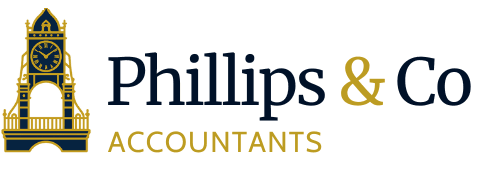Author: Phillips & Co Accountants, Chester
Date: June 03, 2025
As a sole trader or small business owner, you’re likely juggling many tasks. While focusing on your core business is crucial, neglecting your finances can lead to serious problems down the line. Phillips & Co, your trusted local experts in Chester, understand these challenges. This guide offers practical advice to help you stay on top of your finances and ensure your business thrives.
1. Separate Business and Personal Finances
It’s tempting to use your personal bank account for business transactions, but this is a recipe for chaos. Mixing funds makes it difficult to track income and expenses accurately, leading to errors in tax returns and potentially missed deductions. Open a dedicated business bank account and use it exclusively for business transactions. This simplifies bookkeeping, reduces errors, and makes tax management much easier.
2. Master Bookkeeping Basics
Bookkeeping is the foundation of sound financial management. It involves recording all income and expenses, managing invoices, and reconciling bank statements.
- Keep Accurate Records: Meticulously record every transaction, including dates, amounts, and descriptions. Save all receipts and invoices, either physically or digitally.
- Choose the Right Tools: Consider using accounting software like Xero or QuickBooks. These tools can automate many bookkeeping tasks, saving you time and reducing errors. Even a simple spreadsheet is better than nothing.
- Reconcile Regularly: Compare your records with your bank statements monthly to identify any discrepancies.
3. Understand Your Tax Obligations
Sole traders and small businesses have various tax obligations, including Income Tax, National Insurance, and possibly VAT. For more detailed advice on your tax obligations, explore our tax services.
- Self-Assessment: If you’re self-employed, you’ll need to complete an annual Self-Assessment tax return.
- Allowable Expenses: Be aware of what expenses you can deduct from your taxable income. This can include office costs, travel expenses, and business-related insurance. For more on expenses, check out our in-depth sole trader expense guide.
- Plan Ahead: Set aside money for taxes throughout the year to avoid a nasty surprise when the bill arrives.
4. Manage Cash Flow Effectively
Cash flow is the lifeblood of any business. Managing it well ensures you have enough funds to cover expenses and invest in growth.
- Invoice Promptly: Send invoices promptly and accurately, including all necessary details.
- Monitor Cash Flow: Review your incoming and outgoing funds regularly.
- Forecast: Prepare cash flow forecasts to anticipate future needs and potential shortfalls.
5. Avoid Common Accounting Mistakes
Many small businesses make the same accounting mistakes. Here are some to avoid:
- Mixing Personal and Business Finances: As mentioned earlier, keep them separate.
- Poor Record Keeping: Maintain accurate and organized records of all transactions.
- Ignoring Tax Deadlines: Be aware of all tax deadlines and file your returns on time.
- Failing to Reconcile: Reconcile your bank statements regularly.
- Not Budgeting for Taxes: Set aside money for taxes throughout the year.
6. Seek Professional Help
If you’re feeling overwhelmed, consider getting professional help from an accountant. A qualified accountant can provide valuable advice, reduce your administrative burden, and help you minimize your tax liability. Phillips & Co offers a range of services tailored to sole traders and small businesses in Chester. Contact us today for a free consultation and let us help you simplify your finances.
To learn more about your statutory obligations, see our statutory and management accounts page. For comprehensive support, see our accounting packages for sole traders.
Disclaimer
The information contained in this blog is for general guidance only. It does not constitute professional advice and should not be relied upon as such. Always seek tailored advice from a qualified accountant regarding your specific circumstances.
